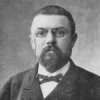Henri Poincare

Henri Poincare
Jules Henri Poincaréwas a French mathematician, theoretical physicist, engineer, and a philosopher of science. He is often described as a polymath, and in mathematics as The Last Universalist by Eric Temple Bell, since he excelled in all fields of the discipline as it existed during his lifetime...
NationalityFrench
ProfessionMathematician
Date of Birth29 April 1854
CountryFrance
intuition logic prove-it
It is with logic that one proves; it is with intuition that one invents.
mind guilty logical
A sane mind should not be guilty of a logical fallacy, yet there are very fine minds incapable of following mathematical demonstrations.
definitions philosopher logic
What is a good definition? For the philosopher or the scientist, it is a definition which applies to all the objects to be defined, and applies only to them; it is that which satisfies the rules of logic. But in education it is not that; it is one that can be understood by the pupils.
science issues logic
Pure logic could never lead us to anything but tautologies; it can create nothing new; not from it alone can any science issue.
knowledge math logic
There are no solved problems; there are only problems that are more or less solved.
intuition logic mathematics
It is by logic that we prove, but by intuition that we discover. To know how to criticize is good, to know how to create is better.
means necessary neither nor
Thus, be it understood, to demonstrate a theorem, it is neither necessary nor even advantageous to know what it means . . . .
american-journalist relations remain replace
Thus, they are free to replace some objects by others so long as the relations remain unchanged.
american-journalist
No more than these machines need the mathematician know what he does.
american-journalist governed phenomenon succeeding
If that enabled us to predict the succeeding situation with the same approximation, that is all we require, and we should say that the phenomenon had been predicted, that it is governed by the laws.
avoiding consists infinite invention useful useless
Invention consists in avoiding the constructing of useless contraptions and in constructing the useful combinations which are in infinite minority. To invent is to discern, to choose.
american-journalist cannot cause determines due effect escapes notice
A very small cause which escapes our notice determines a considerable effect that we cannot fail to see, and then we say that the effect is due to chance.
american-journalist believe both convenient equally necessity
To doubt everything, or, to believe everything, are two equally convenient solutions; both dispense with the necessity of reflection.
american-journalist species
It has adopted the geometry most advantageous to the species or, in other words, the most convenient.